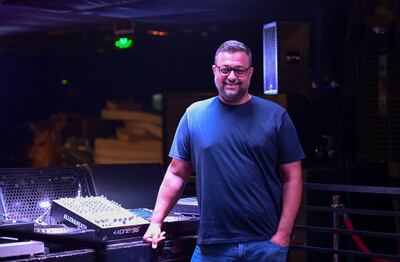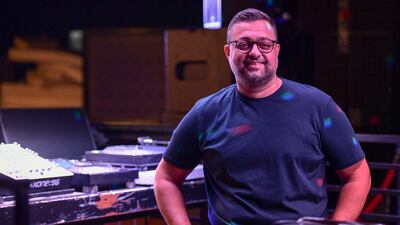Mehdi Ansari is founder, chief promoter and a resident performer at Analog Room, a Dubai music community based at The Q Underground in Al Barsha.
The Iranian-born creative has been instrumental in the region’s electronic music scene and has spent 13 years in the UAE.
Experience and music production knowledge has led Mr Ansari to collaborate with numerous artists, as well as working with his brother, Salar, on their Machine Machine project.
Analog Room has endorsements from influential figures such as American DJ and producer Delano Smith and British record producer and musician A Guy Called Gerald. Mr Ansari’s broader business interests include electric vehicles and developing audio technology.
Now 38, he has two daughters, aged seven and nine, and splits his time between Dubai and Tehran.
Did wealth feature in your family?
We are an educated family, my grandfather and father were both engineers. They’ve always been in heavy industry. We have never been rich, but I never felt like we were poor.
We were proud of my father’s achievements with the factory. They built pressure vessels for oil and gas, some shipbuilding. Since I was young, I was in the factory, handling machines, learning to weld.
Have you had a regular career?
I never had a job, except in my dad’s company, never got hired anywhere in my life. All summers were spent in the factory, in the office. I learnt contracts, research development, things valuable for life.
I got paid there a few times. Someone hired me as a freelancer, maybe for programming. I DJ’d, got some money but nothing serious, until I did parties and got the revenue.
What led you to the UAE?
My dad opened a Dubai trading office that mostly serviced our company in Iran. I came and studied for an audio engineering degree. I was also working at the office, sending emails, preparing documents … pocket money.
How did music become a passion?
I studied industrial metallurgy before studying audio, but music was always part of the family … having fun. It was tradition, even during the [Iran-Iraq] war. I remember they were cutting power and these guys had battery-ready Hi-Fi, boom boxes and stuff. They kept the party on. Iranians have deep roots in art and music.
What prompted Analog Room?
We’d never been to nightclubs, always house parties. Going to clubs and bars in Dubai was fine, it was new, but then I went to Berlin and realised that the world knows how to party, they do it as experts, with proper sound, proper lighting.
I started to learn more while studying audio engineering. We became nerds of audio clubbing, did events with a friend who started underground, low-key parties.
But I needed money. My father told me to write a business plan. I convinced him this was what I wanted to do and there was money in it. He gave me Dh30,000, we booked five acts, a sound system, distributed flyers.
Did those early events break even?
We did five parties. They were really fun, not financially profitable. We lost money. They were not cheap bookings, but got a good reception and the city was talking about it.
We were super successful from 2013 to 2016 and we reinvested, brought bigger artists, made it better. I paid back the Dh30,000. It became more meaningful to everyone and started giving people careers.
It was never about the money, and then it made money. Then it lost money, and that’s the way it became about money. You can’t achieve your goal if you’re not financially reasonable; it has to at least pay for itself.

How is your relationship with money?
I’m a spender. I was not that thirsty for money and never really stressed about it, even when I was broke. I never spend much on things but when I have money, I travel business.
What do you invest in?
I’m an entrepreneur with 10 different businesses. Any money you give me, I have holes for it.
I started things in Iran during Covid-19, opened the Society of Arts and Technology, teaching people how to create content and developing artists.
I love cars, so I’ve got a start-up that does EV technology development. We run a garage working on our first car, a classic being converted to electric.
I’m also building an audio mixer, in final design, and we are working on food and beverage things in Dubai.
And your best investment?
It must be Analog Room, if not my wife. Investment is not always money. Time is the biggest investment and sharing it with someone else.
I also did a smart thing buying a sound system [early on], for Dh120,000 ($32,675). That enabled us, as Analog Room, to play anywhere – any basement, boat parties, new venues – and get better deals.
The most successful financial thing is I got the opportunity to create something and got into other arts and culture opportunities.
founder of Analog Room
How do you view money?
It became such a standard for people that their goal in life is financial accomplishments. People do things they don’t like. I’m not that poor, I’m not rich, but I have food, a roof over my head.
Definitely money is required, to a certain extent. Why most people are after money is either physical comfort and entertainment, or the mental comfort that comes from being relaxed about the future. The problem with comfort is you get used to it, fast.
There’s enough money in the world for everybody to do what they’re passionate about and be happy – money will come.
Are you wise with cash?
I waste a little here and there, to enjoy myself. Being an entrepreneur, there are many times I don’t have a lot of money in my account and I’m waiting on money. My wife helps me be more balanced.
Any spending regrets?
I paid a deposit to buy a Porsche 911 – and then the bank didn’t approve the loan. I was self-employed. I had a good income, but they didn’t find it very safe, I guess. The guy didn’t give my deposit back. It hurt.
What purchases bring you joy?
I don’t buy a lot of stuff, but I’m a bit of a foodie.
Cars are my weakness. I drive a Series 1 Range Rover in Iran. It’s a classic, becoming collectible and valuable.
I never had a lot to spend on cars. When and if I have money, I will. That’s not the purpose of life for me, of course, but it’s more than just a unit of transportation for me.
How did you adapt to the pandemic?
We were just flying … Covid took me back five years. It was hard to re-establish things, but I’m getting back there, it’s getting exciting again.
We actually did some great work during Covid; we released A Guy Called Gerald’s record on our record label and did great streams.
Are you confident about your financial future?
I never looked at money going down road. I’m not worrying about money and I have this good feeling everything is going to come together.
Luckily, my businesses all look like they’re ending somewhere. Money is going to be fine. I’m happier that I did things I wanted to do.

